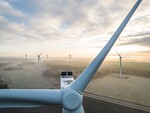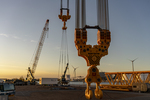02/25/2007
Decision makers must heed Stern warning on climate change
With crucial warnings on the need to take urgent action on climate change echoing around the world, BWEA releases shocking new evidence showing that decision makers for new onshore wind projects have not been responding to the environmental challenge.
Since the publication of the seminal Stern Review in October 2006, BWEA can exclusively reveal that 12 of 18 decisions for onshore wind farms have been refused – giving an average approval rate of just 33% - and that where the Planning Inspectorate was called in to adjudicate, the performance drops even further with just 2 from 7 decisions being positive – an average 28%. This compares to an average approval rate of 76% for all major applications, such as offices, dwellings and retail.
At a time when climate change and energy security are apparently now top of the political agenda, and certainly at the top of the public agenda, the discrepancy between the rhetoric and actual decisions on carbon free energy projects is growing ever larger.
And it is not just poor decisions that are jeopardising the UK renewables future: planning delays are seriously affecting confidence in the sector. Onshore wind projects that could generate 6% of UK total electricity supplies are currently in limbo at various stages in the planning system, some for more than 5 years.
As BWEA CEO Maria McCaffery commented:
"The planning process has been a thorn in the side of the UK wind industry as we strive to meet the Government's 10% renewable energy target by 2010. We have proven as an industry that we can deliver on a large scale, here and now, but this momentum can only be maintained with more timely and consistent decision making in the UK. The new focus on climate change must be adopted as quickly as possible at all levels of government and across all regions in the UK. Climate change is now at the top of the public agenda - it is time for governments to respond with more resource, commitment and monitoring and enforcement of the planning system to better reflect the urgency of action needed."
BWEA is now calling for action in 6 key areas:
- UK Government, the Scottish Executive and the Welsh Assembly to monitor and enforce their own national policy and provide greater commitment and resources to all decision makers
- Provision of a clear Government national planning statement which makes their position clear in relation to the various issues relevant to wind energy, in order to promote consistency in decision making and to prevent numerous non-planning issues being rethought at one inquiry after another
- Local planning and appeal decisions from the Planning Inspectorate to be in line with national planning and energy policy and to better reflect the national need for renewable energy
- Government provision of improved information, especially the Statement of National Need contained in the Energy Review, to raise the awareness of decision makers of the need for wind energy, and of the issues to be addressed in decision making
- Decision times to be significantly reduced at the local level and to be monitored and enforced with a combination of incentives for prompt decision making and disincentives for delays
- A greater commitment to decision making for larger wind farm projects determined under Section 36 of the Electricity Act. This requires greater resource on a scale to match the contribution that these onshore wind projects can make in tackling the urgent issues of climate change and energy security
Until now there’s been a failure to recognise the overriding importance of climate change when considering new developments. Decision makers must embrace the spirit of planning guidance and make sure that cutting emissions becomes a top priority. Communities need to participate fully in the planning process to ensure we all contribute to delivering solutions.
If we are to avoid catastrophic climate change we must switch to clean energy sources as a matter of urgency. Wind power has already shown that it can deliver carbon free energy on a large scale but prompt decisions must to be taken in order for us to keep on delivering.
2007 is the year which determines whether the Government’s 10% renewable energy target by 2010 can be met: for projects to contribute to the target, consents must be awarded by the end of 2007 in order for the industry to build by 2010.
See the full report online at http://www.bwea.com/pdf/briefings/ukwindplanningstatusMar07.pdf
Since the publication of the seminal Stern Review in October 2006, BWEA can exclusively reveal that 12 of 18 decisions for onshore wind farms have been refused – giving an average approval rate of just 33% - and that where the Planning Inspectorate was called in to adjudicate, the performance drops even further with just 2 from 7 decisions being positive – an average 28%. This compares to an average approval rate of 76% for all major applications, such as offices, dwellings and retail.
At a time when climate change and energy security are apparently now top of the political agenda, and certainly at the top of the public agenda, the discrepancy between the rhetoric and actual decisions on carbon free energy projects is growing ever larger.
And it is not just poor decisions that are jeopardising the UK renewables future: planning delays are seriously affecting confidence in the sector. Onshore wind projects that could generate 6% of UK total electricity supplies are currently in limbo at various stages in the planning system, some for more than 5 years.
As BWEA CEO Maria McCaffery commented:
"The planning process has been a thorn in the side of the UK wind industry as we strive to meet the Government's 10% renewable energy target by 2010. We have proven as an industry that we can deliver on a large scale, here and now, but this momentum can only be maintained with more timely and consistent decision making in the UK. The new focus on climate change must be adopted as quickly as possible at all levels of government and across all regions in the UK. Climate change is now at the top of the public agenda - it is time for governments to respond with more resource, commitment and monitoring and enforcement of the planning system to better reflect the urgency of action needed."
BWEA is now calling for action in 6 key areas:
- UK Government, the Scottish Executive and the Welsh Assembly to monitor and enforce their own national policy and provide greater commitment and resources to all decision makers
- Provision of a clear Government national planning statement which makes their position clear in relation to the various issues relevant to wind energy, in order to promote consistency in decision making and to prevent numerous non-planning issues being rethought at one inquiry after another
- Local planning and appeal decisions from the Planning Inspectorate to be in line with national planning and energy policy and to better reflect the national need for renewable energy
- Government provision of improved information, especially the Statement of National Need contained in the Energy Review, to raise the awareness of decision makers of the need for wind energy, and of the issues to be addressed in decision making
- Decision times to be significantly reduced at the local level and to be monitored and enforced with a combination of incentives for prompt decision making and disincentives for delays
- A greater commitment to decision making for larger wind farm projects determined under Section 36 of the Electricity Act. This requires greater resource on a scale to match the contribution that these onshore wind projects can make in tackling the urgent issues of climate change and energy security
Until now there’s been a failure to recognise the overriding importance of climate change when considering new developments. Decision makers must embrace the spirit of planning guidance and make sure that cutting emissions becomes a top priority. Communities need to participate fully in the planning process to ensure we all contribute to delivering solutions.
If we are to avoid catastrophic climate change we must switch to clean energy sources as a matter of urgency. Wind power has already shown that it can deliver carbon free energy on a large scale but prompt decisions must to be taken in order for us to keep on delivering.
2007 is the year which determines whether the Government’s 10% renewable energy target by 2010 can be met: for projects to contribute to the target, consents must be awarded by the end of 2007 in order for the industry to build by 2010.
See the full report online at http://www.bwea.com/pdf/briefings/ukwindplanningstatusMar07.pdf
- Source:
- Bristishe Wind Energy Association
- Author:
- Edited by Trevor Sievert, Online Editorial Journalist
- Email:
- alison@bwea.com
- Link:
- www.bwea.com/...
- Keywords:
- wind energy, wind turbine, rotorblade, renewable energy, wind farm









